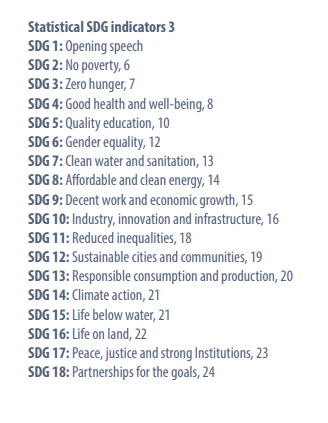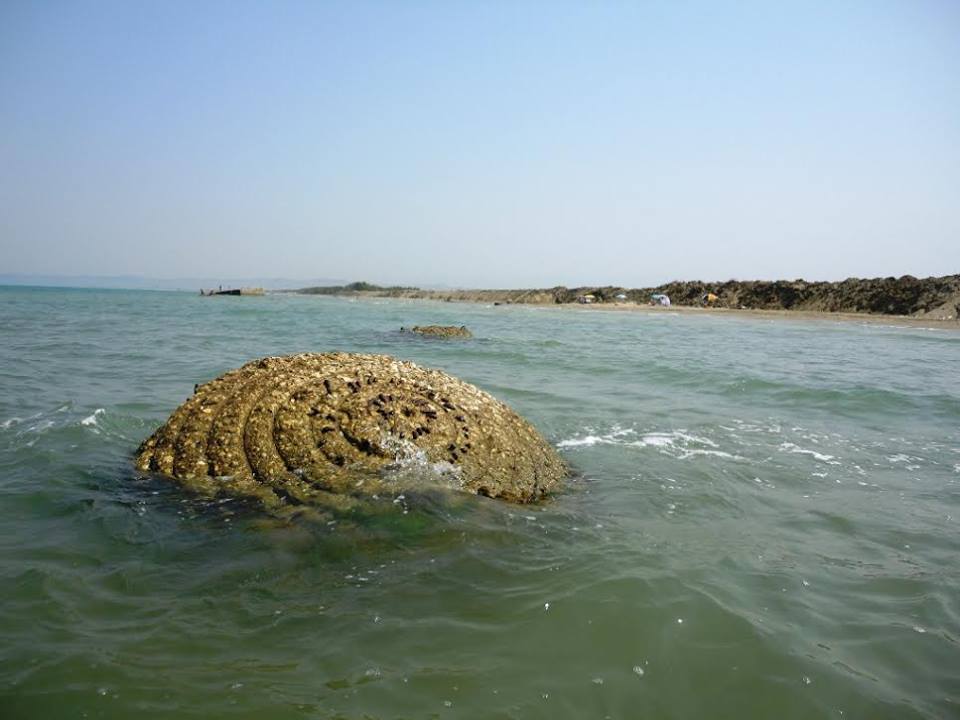TIRANA, 19 June
While Albania still struggles with waste management infrastructure and its dependence on Hydropower energy generation, the country still has no strategy, or legal framework, or an assessment of the long-term economic impacts of climate change.
Over a month ago, on 17 May the Albanian Institute of Statistics (INSTAT) published a document on statistical indicators on Sustainable Development Goals (SDGs). Report here: sdg instat

Besides that fact that it listed Opening speech as SGD 1, thus taking the number of SDGs to 18, the publication had no available data on two specific SDGs related to two global burning issues: Goal 14: Life below water and Goal 13: Climate Action.
According to the report, it presented the work started in 2015 by the Albanian government in meeting the Sustainable Development Goals. Out of the total 232 (excluding the nine indicators that repeat on different SDGs) indicators from the global indicator framework, the report provided statistical data only for 59 indicators.
EC Findings on Environment and Climate Change based on Albania 2019 Report
Later on 29 May the European Commission unveiled the 2019 Report for Albania, which also included data on the action towards reducing the impacts of climate change in alignment with the EU Acquis.
According to the report: “The EU promotes strong climate action, sustainable development, and protection of the environment. EU law contains provisions addressing climate change, water, and air quality, waste management, nature protection, industrial pollution, chemicals, noise, and civil protection.”
Key findings:
Albania shows some level of preparation in this area.
Limited progress was made in further aligning the policies and legislation with the acquis, in areas such as water management.
Moreover, significant efforts are needed for implementation and enforcement, especially in the water sector and on climate change. In the coming year, Albania should in particular:
- align with key water directives and accelerate the capacity development of the national agencies for Water Resource Management and for Water Supply, Sewerage and Waste Infrastructure;
- take immediate measures to review and improve environmental and strategic impact assessments on existing and planned projects, plans and programs, especially in the hydropower, construction, tourism, and mining sectors;
- start implementing the Paris Agreement by adopting a national strategy and legislation on climate change, and by starting to develop integrated National Energy and Climate Plans in line with Energy Community obligation.
Environment
As regards horizontal issues, further progress is needed to achieve full alignment and implementation.
The implementation of the Environmental Impact Assessment Directive (EIA) needs to be strengthened, especially in the hydropower and mining sectors. Permits for the construction of several new hydropower plants and tourist resorts in protected areas have been issued, with concerns pertaining to the quality of EIAs and public participation.
Albania has aligned to some extent with the Directive on establishing an infrastructure for spatial information (INSPIRE). More effort is needed to achieve effective public participation and consultation in the decision-making process, particularly at the local level.
Further progress is needed to achieve full compliance with the remaining cross-cutting aspects of the directives on environmental liability, environmental crime, and environmental inspection. The lack of a secondary legal framework is hampering the establishment of an adequate process and assessment of environmental liability for damage to the environment.
Staff replacement has weakened the competences of inspectorates to carry out their functions.
Further alignment with the directive on environmental crime still needs to be done.
More efforts are needed to further align the legislation on air quality with the acquis.
The national strategy for air quality has not been adopted. Despite full alignment with the directive on ambient air quality and cleaner air for Europe, the law on ambient air quality needs to be properly enforced and the current air quality monitoring network and practices to be aligned with EU standards. The environment agency should conduct regular monitoring of industries and installations which potentially emit large quantities of pollutants in the air. Further effort is needed to reduce the sulfur content of certain liquid fuels.
The legal framework for waste management is partially aligned. The draft National Strategy for Integrated Waste Management is in the consultation phase. Further efforts are needed to close the over 199 non-compliant landfills and dumpsites, and to start implementing a separate collection of waste streams, increase recycling and reuse, and start composting bio-waste. Only 65% of waste is collected and there is no recycling of demolition waste.
Economic instruments to promote recycling and prevent waste generation remain limited.
The construction of an incinerator in Elbasan and the starting of procedures for the construction of two more incinerators in Tirana and Fier pose concerns in terms of compliance with EU Directives on Waste, the waste hierarchy principle with incineration as the least preferred waste management option, and with the EU targets for recycling.
On water quality, the level of alignment remains unchanged and partial, with important directives still not aligned. The National Agency for Water Supply, Sewerage and Waste Infrastructure has been given additional competences but has to increase its capacity. Municipal utilities have to increase performance and sustainability. The existing wastewater treatment plants face operation and maintenance issues.
There is a strong need to extend the sewage networks and build new treatment plants, notably in urban, coastal and touristic areas. The integrated water resource management strategy has been adopted, and a new agency for water resource management has been created which has to rapidly build its capacities especially for river basin management.
River basin management plans elaborated should be adopted promptly. The number of water quality monitoring points slightly increased, but the monitoring and reporting system has to develop further. The National Environment Agency should be urgently strengthened for this purpose.
Alignment with the acquis in the field of nature protection, in particular, the Habitats and Birds Directives, is well advanced. The law on protected areas was amended in 2018 to emphasize the planning and development of protected areas.
The 2016 Strategic Investment law raises concerns for the protection of biodiversity, as it can allow large tourism and industrial investments in protected areas, namely in the Divjaka-Karavasta National Park and in the Vjosa-Narta Protected Landscape, in contradiction with existing national laws and international conventions on biodiversity protection that Albania has ratified.
Capacities and financial instruments for National Protected Areas Agency remain very limited, with the law forbidding its financial autonomy.
Enforcement of the laws needs to be guaranteed in case of deforestation and logging, and culprits need to be prosecuted.
Investments in hydropower need to comply with national and international nature protection and water management obligations, ensure public participation and consultation and guarantee high-quality EIA reports that include impact assessments on nature and biodiversity.
Alignment with the EU legislation on industrial pollution and risk management is still at an early stage.
Capacity constraints are hampering progress in implementing legislation on the prevention of major accidents involving dangerous chemicals.
Permitting is not fully compliant with all legal requirements and there is no independent monitoring of industrial pollution. The limited data on industrial pollution relies on companies’ self-monitoring and declaration. The enforcement capacity of the environment inspectorate is very limited.
On chemicals, some positive steps have been taken towards aligning with the EU Regulation on registration, evaluation, authorization, and restriction of chemicals (REACH). However, the adoption of implementing legislation and the establishment of adequate administrative structures are still needed.
Administrative capacity for preparing strategic noise maps and action plans needs to be strengthened. No civil protection strategy is in place.
The existing civil emergencies law and national plan are outdated and do not take into account recent institutional and organizational changes. The new civil protection law under elaboration is not yet finalized. There is very limited administrative capacity, and the envisaged creation of a civil protection agency has not materialized.
Floods remain a major hazard; however, no progress has been made on the transposition of the floods directive. The early warning system and the hydrometric and meteorological system still need to be regulated.
Albania is not yet a participating State of the Union Civil Protection Mechanism and is not linked to the Common Emergency Communication and Information System (CECIS) yet. In view of their future participation in the Union Civil Protection Mechanism, Albania needs to establish relevant Secure Trans European Services for Telematics between Administrations (sTESTA) connections as a precondition to connect to CECIS.
Climate change key findings
Albania has achieved some level of preparation to climate change, but alignment with the EU acquis is still limited. Some progress was made by ratifying the Kigali Amendment to the Montreal Protocol.
A national strategy on climate change consistent with the EU 2030 framework on climate and energy policies needs to be adopted and a National Energy and Climate Plan in line with Energy Community recommendation has to be developed.
No specific administrative structure for handling climate change issues is in place. Regarding its reporting obligation under the United Nations Framework Convention on Climate Change, Albania is preparing its Fourth National Communication and its First Biennial Update Report.
The law on climate change and accompanying decisions, partly transposing provisions the EU Emissions Trading Directive, still need to be adopted.
Further efforts should be made on emission standards for new cars and vans and related consumer information. Similar efforts are needed regarding effort sharing, geological storage of CO2, and greenhouse gas emissions from land use, land use change, and forestry.
Considerable strengthening of administrative capacity, allocation of the necessary financial resources as well as awareness-raising activities are needed.
Source: INSTAT/ec.europe.eu
Photo: marine erosion in the Adriatic Coast, credit: Rrushkulli


Leave a Reply
You must be logged in to post a comment.